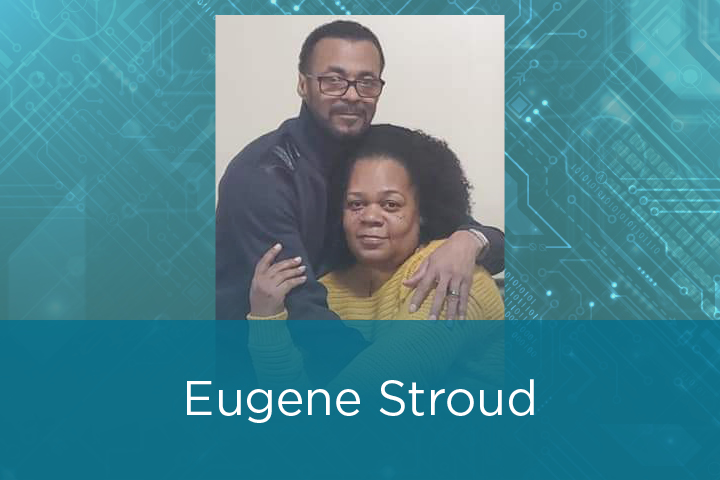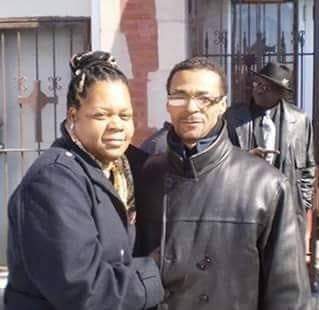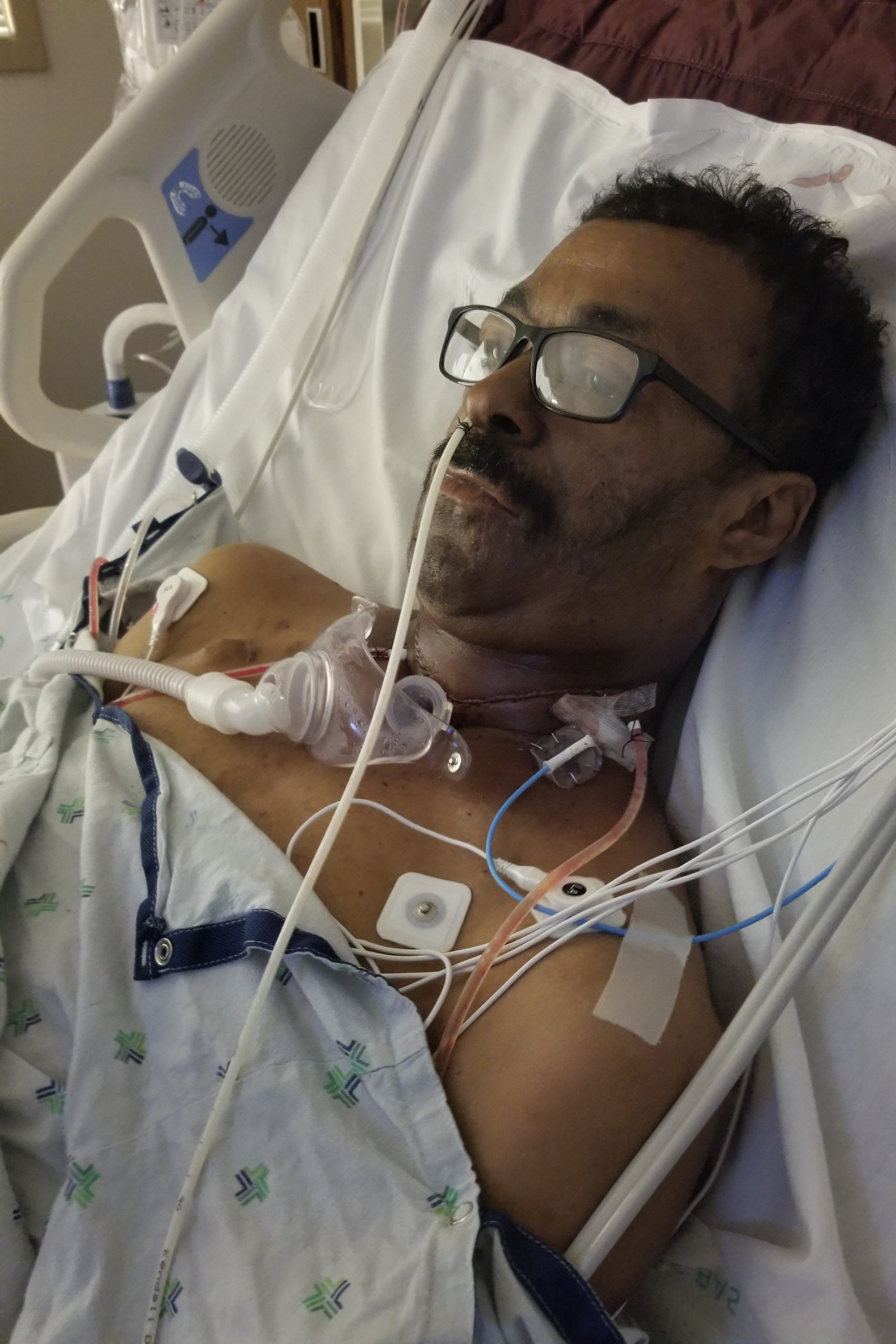
Throat cancer was not going to silence Eugene Stroud.
Affectionately nicknamed “Gene the Talker,” the 59-year-old Stroud would regale people with stories at family functions, work, church, anywhere there was an audience. When Virginie Achim, MD, University of Illinois Cancer Center member and assistant professor of otolaryngology-head and neck surgery at UI Health, advised Stroud that his best chance of surviving throat cancer was to perform a laryngectomy, he was devastated.
“I immediately thought my world was over when Dr. Achim explained that she wanted to remove my voice box,” Stroud said. “I’m sitting there weighing about 108 pounds, weak and sad. Dr. Achim told my wife, Ester, and I that she wanted to act immediately. We went home after my appointment and I had all of these negative feelings – failure, hate, remorse. I just wanted to give up.”
Following dinner that evening, Eugene and his family – Ester and their two children – discussed the surgery that Achim recommended. Numerous questions were bandied about by his family – when is the surgery, how long would he be in the hospital – but none of the answers mattered to Eugene. He had made up his mind that he wasn’t going to undergo the procedure.
“I woke up about 2:30 in the morning feeling defeated, and that’s when Ester let me have it,” said Eugene of his wife of 29 years. “She told me to stop feeling sorry for myself.”
Ester said they had overcome so much in their lives – burying their youngest son due to the violence in Chicago, losing a job, and eventually their house and car. “Look at us now,” she said. “We have a nice place to stay, a car, a job you love and three beautiful grandsons. You never complain. You’re strong, and you’re going to have the surgery.”

Eugene was referred to Achim in February 2019. At the time of Eugene’s initial presentation, Achim discovered he had a supraglottic mass that begins in the area above the vocal cords. Eugene believed he was going to live the rest of his life with cancer, but Achim conveyed to her new patient that there’s always a chance of survival.
“I remember Dr. Achim telling me that my life is going to be different but I have a chance to live,” Eugene said.
Following biopsy surgery on Feb. 19, 2019, Achim recommended Eugene’s stage IV cancer be treated using chemotherapy and radiation. Upon completion of the treatment on May 24, 2019, “it was apparent there was residual cancer,” Achim said.
Since the initial treatment failed to cure his cancer, Eugene underwent the surgery his family hoped would save his life. Barry Wenig, MD, MPH, FACS, Francis L. Lederer Professor of Otolaryngology at UI Health, performed the cancer resection, while Achim executed the reconstruction. Eugene’s larynx and a portion of his throat were removed, and Achim then created a new “throat” through a procedure known as “free flap.” Skin and fascia were removed from the underside of Eugene’s forearm near his wrist, along with the artery and vein, and transferred and sewn to an artery and vein in the neck, thereby creating a new blood supply.

“It’s similar to a transplant, except that it involves transplanting one’s own tissues (flap) from one part of the body to another,” said Achim of the surgery that took about eight to 10 hours.
When Eugene awoke the following morning, he looked in a mirror and was mortified at the reflection he saw staring back at him. “I looked like a monster,” he said. Ester didn’t see what her husband did. She saw the person she began dating as a teenager 39 years ago. She was happy he was alive. Ester came every day to visit him in the hospital in hopes of lifting his spirits.
One evening, alone in the hospital, Eugene began to cry, telling himself, “I don’t want to be like this.” The next morning, he decided to give himself a second chance. The first thing Eugene wanted to do was get out of bed, but the nurse said it was too soon. The next day, however, his attending physician and a group of interns visited him in his room and he again asked if he could get out of bed and sit near the window so he could see all the activity that was occurring outside on the streets of Chicago. To his surprise, he was allowed to do so. He was disconnected from the machines that were attached to his body and helped to the chair.
“It was the best feeling ever,” Eugene said. “Two days later I started to walk up and down the hallway, and around the fourth day I walked the stairs. I would walk past other cancer patients and give them a thumbs up. I was feeling so much better. My healing was remarkable. I believe it’s all in your mind. I have always read that the mind is power.”
All but the feeding tube was removed from Eugene’s body, leaving him to nourish his body only through liquids. He was experiencing little or no pain. Only a few short days before, Eugene felt like giving up. Now, after arrangements were made for a nurse to visit him at home, he was discharged from the hospital.
A renewed energy followed Eugene home. He began feeding himself and was getting stronger by walking up and down the stairs. His health was returning, but his voice remained silent. He was communicating through the use of a pen and paper but it didn’t matter. “I was alive,” Eugene said.
Today, the pen and paper have been replaced by a voice-prosthesis, a hands-free device that “sounds robotic but I can speak freely.” He is also working diligently with a speech therapist in hopes of one day restoring his voice.
Throughout his life, Eugene has always found inspiration through helping others. A colleague of Ester’s recently approached her and said his father, General Estes, had recently undergone the same procedure as Eugene at UI Health and was experiencing the same negative feelings that Eugene had felt earlier. He asked Ester if Eugene could visit his father to boost his morale, to show him that throat cancer was not a life sentence. When Eugene and Ester arrived at Estes’ room, Eugene couldn’t believe who it was. Estes used to live in Eugene’s old Chicago neighborhood, and they hadn’t seen each other in many years. The two shared stories of what their lives had become, Eugene using his vocal device and Estes using pen and paper.
“General’s wife told me that they prayed for someone to come and talk to him and God sent Eugene,” Ester said. “Three days later General’s son said they released his father from the hospital. He said he didn’t know what Eugene said to his dad, but he’s a changed man and he’s home.”
Achim said Eugene is in good health today. His most recent surveillance scan showed no evidence of cancer. He is able to consume all of his diet orally, and he has regained the nearly 40 pounds he lost during his cancer treatments. His voice prosthesis allows him to communicate without pain. His voice, she said, “is not like someone who has never had surgery, but he is understandable and able to communicate verbally with others.”
For Eugene, he is grateful for that, because not talking was nearly as painful as throat cancer.
